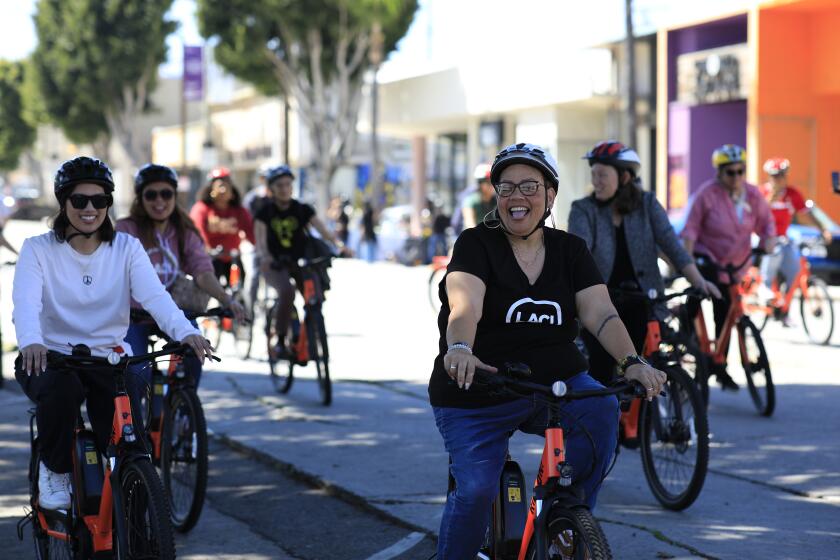Southwest Airlines’ ‘bags fly free’ strategy pays off
To the frustration of many travelers, the nation’s 10 largest airlines have collected about $740 million in baggage fees in the third quarter of this year -- a 111% increase over the same period in 2008.
With those kind of numbers from the U.S. Bureau of Transportation Statistics, it’s hard to tell who is profiting most from the baggage fees -- the airlines that charge to check bags or Southwest Airlines, the lone large carrier that still doesn’t make passengers pay to check their first two bags.
In the third quarter, Delta Air Lines, the world’s largest airline, collected the largest amount in baggage fees -- $130 million, a 172% increase over the same period in 2008.
But Southwest Airlines doesn’t seem to be hurt by the decision to forgo the fees.
Speaking this week in New York to the Wings Club, a group of aviation professionals, Chairman Gary Kelly sounded nearly giddy about Southwest’s success in 2009. He said he was “overjoyed” that Southwest now serves more passengers than any other U.S. airline.
Although the airline cut capacity by 5% in 2009, it added service to four airports -- New York’s LaGuardia, Boston, Minneapolis-St. Paul and Milwaukee. At the same time, Kelly said, the airline has increased its market share by 1 percentage point and has even offered all employees raises during one of the worst financial slumps in airline history.
“It’s just been a very, very gratifying year,” he said.
Kelly said the “bags fly free” strategy was a key reason the airline gained market share this year.
Julius Maldutis, an economist and consultant to the airline industry, called Southwest’s no-bag-fee strategy “absolutely brilliant.”
“That is their key marketing strategy, and they are winning big,” he added.
Henry Harteveldt, a travel industry analyst with Forrester Research Inc., agreed, saying the strategy has helped Southwest gain market share. But he said the fees charged by the other airlines had resulted in huge revenues that the carriers wouldn’t have otherwise collected. In the war of bag-fee strategies, Harteveldt said, “it’s a draw.”
But the question on the mind of most Southwest passengers may be: How long can the airline resist the temptation to charge for the first two checked bags?
Maldutis believes that Southwest will resist adding the bag fee but says it probably will add other fees instead.
“People absolutely resent that they get charged for baggage,” he said. “I don’t see them abandoning it.”
Harteveldt said Southwest would continue to resist the fees because it had spent months ridiculing competitors that charge the fee. To change the policy now, he said, would be a “tough marketing challenge.”
Fuel costs represent nearly 25% of an airline’s operating expenses, so if the price begins to soar next year, Harteveldt said customers might forgive Southwest for adding the fee.
For now, Southwest spokeswoman Olga Romero said the airline had no plans to change its fee policy. “We never say never, but then again it is working for us,” she said.
Nutrition lacking in airline food
Another big source of revenue for airlines is in-flight meals. But what kind of nutrition do passengers get for their food dollar?
Charles Stuart Platkins, a nutrition expert, offers an annual ranking and analysis of many food options offered to airline passengers, including calories and nutritional value. He hosts the cable television network We TV series “I Want to Save Your Life.”
Continental Airlines won top honors in his ranking this year for offering a variety of options and low-calorie snacks and meals. Platkins, founder of dietdetective.com, likes the “petite cold sandwiches,” light on the mayo.
American Airlines came in second with Platkins, who likes the “cheese and cracker snack tray.” Platkins suggests that weight watchers skip the crackers, however.
United Airlines finished third. It was criticized by Platkins for its selection of calorie-laden snacks, including a bag of potato chips (900 calories), a chocolate bar (510 calories) and shortbread cookies (540 calories).
To burn off the calories from a bag of airline potato chips, Platkins estimated that an average person would need to walk for nearly four hours.
“As far as the individual snacks are concerned, wow, those are some pretty high-calorie items,” he said.
At the bottom of the seven carriers ranked was Southwest Airlines. Platkins says the carrier doesn’t offer much variety and few healthy options.
“Go for the nuts and skip the pretzels and other items,” he advises.






